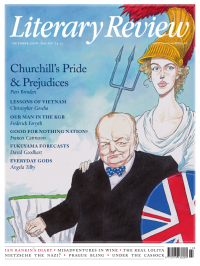André Naffis-Sahely
Copacabana’s Boys
The Piranhas
By Roberto Saviano (Translated by Antony Shugaar)
Picador 368pp £14.99
Roberto Saviano’s The Piranhas addresses a simple question: what happens when the older mafiosi go to prison? As the novel shows, the guaglioni – Neapolitan for ‘boys’ – take over and mayhem ensues. The guaglioni are the ‘malleable raw material’ plentifully available in the city’s old neighbourhood of Forcella. They are ‘minors with no criminal records’ who are ‘barely old enough to drive a motor scooter’, and therein lies their usefulness. Before long, we are introduced to Copacabana, an underboss for the Camorra who earned his sobriquet by buying a hotel in Brazil frequented by Drake, Maradona and Lady Gaga. Up to his neck in indictments, Copacabana recruits fifteen-year-old Nicolas and his friends to replace street soldiers lost to violence or the law. In a city where ‘there are no paths to growing up: you’re born straight into reality’, the boys quickly embrace Copacabana’s proposition. Employing his trademark colloquial bluntness, Saviano sketches the motivations behind the boys’ decision: ‘They thought about the skinny wallets their parents carried, even after laboring all day long, struggling to squeeze out a little more money with extra jobs and odd jobs, breaking their backs, and now they felt that they’d figured out the world much better than their parents ever had. They were wiser, more grown up. They were more like men than their own fathers were.’ The newly ‘made’ teenagers begin small, filling Copacabana’s pockets by slinging hash to family and friends, hanging around the New Maharaja nightclub even though they’re too young to drink.
However, once the guaglioni get their hands on guns, they embark on brutal sprees reminiscent of scenes from Anthony Burgess’s A Clockwork Orange, propelled by their faith in life’s most important rule: ‘you’re born either fucked or a fucker. The latter knows how to steal and deceive, and

Sign Up to our newsletter
Receive free articles, highlights from the archive, news, details of prizes, and much more.@Lit_Review
Follow Literary Review on Twitter
Twitter Feed
Literary Review is seeking an editorial intern.
Though Jean-Michel Basquiat was a sensation in his lifetime, it was thirty years after his death that one of his pieces fetched a record price of $110.5 million.
Stephen Smith explores the artist's starry afterlife.
Stephen Smith - Paint Fast, Die Young
Stephen Smith: Paint Fast, Die Young - Jean-Michel Basquiat: The Making of an Icon by Doug Woodham
literaryreview.co.uk
15th-century news transmission was a slow business, reliant on horses and ships. As the centuries passed, though, mass newspapers and faster transport sped things up.
John Adamson examines how this evolution changed Europe.
John Adamson - Hold the Front Page
John Adamson: Hold the Front Page - The Great Exchange: Making the News in Early Modern Europe by Joad Raymond Wren
literaryreview.co.uk